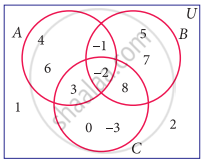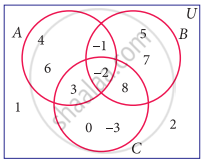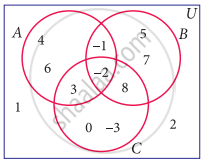Advertisements
Advertisements
प्रश्न
If K = {a, b, d, e, f}, L = {b, c, d, g} and M = {a, b, c, d, h} then find the following:
(K ∩ L) ∪ (K ∩ M) and verify distributive laws
उत्तर
K = {a, b, d, e, f}, L = {b, c, d, g} and M = {a, b, c, d, h}
(K ∩ L) ∪ (K ∩ M)
(K ∩ L) = {b, d)
(K ∩ M) = {a, b, d}
(K ∩ L) ∪ (K ∩ M) = {b, d} ∪ {a, b, d} = {a, b, d}
Distributive laws
K ∪ (L ∩ M) = (K ∪ L) ∩ (K ∪ M)
{a, b, c, d, e, f) = {a, b, c, d, e, f, g} ∩ {a, b, c, d, e, f, h}
= {a, b, c, d, e, f}
Thus Verified.
K ∩ (L ∪ M) = (K ∩ L) ∪ (K ∩ M)
{a, b, d} = {a, b, c, d, e, f, g} ∪ {a, b, c, d, e, f, h}
= {a, b, d}
Thus Verified.
APPEARS IN
संबंधित प्रश्न
Using the adjacent Venn diagram, find the following set:
A – B
Using the adjacent Venn diagram, find the following set:
B – C
Using the adjacent Venn diagram, find the following set:
A’ ∪ B’
Using the adjacent Venn diagram, find the following set:
(B ∪ C)’
If K = {a, b, d, e, f}, L = {b, c, d, g} and M = {a, b, c, d, h} then find the following:
K ∪ (L ∩ M)
If A = {b, c, e, g, h}, B = {a, c, d, g, i}, and C = {a, d, e, g, h}, then show that A – (B ∩ C) = (A – B) ∪ (A – C)
If A = {x : x = 6n, n ∈ W and n < 6}, B = {x : x = 2n, n ∈ N and 2 < n ≤ 9} and C = {x : x = 3n, n ∈ N and 4 ≤ n < 10}, then show that A – (B ∩ C) = (A – B) ∪ (A – C)
If A = {– 2, 0, 1, 3, 5}, B = {–1, 0, 2, 5, 6} and C = {–1, 2, 5, 6, 7}, then show that A – (B ∪ C) = (A – B) ∩ (A – C)
If U = {4, 7, 8, 10, 11, 12, 15, 16}, A = {7, 8, 11, 12} and B = {4, 8, 12, 15}, then verify De Morgan’s Laws for complementation
Verify (A ∩ B)’ = A’ ∪ B’ using Venn diagrams
